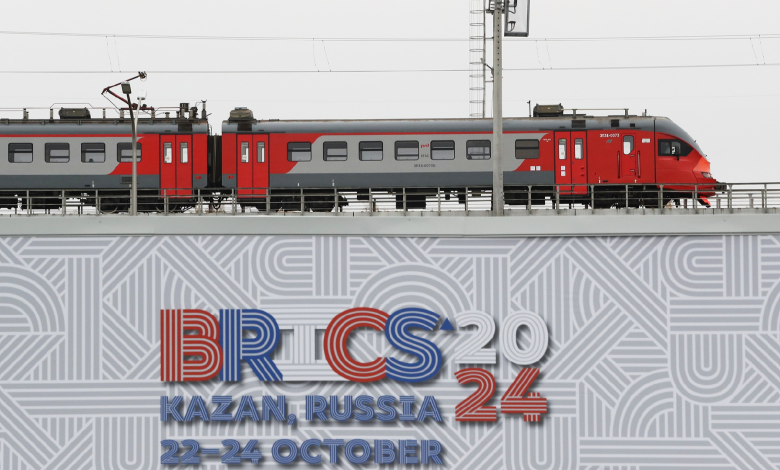BRICS grows increasingly attractive to Global South: Expert

[ad_1]

<img src='https://news.cgtn.com/news/2024-10-22/BRICS-grows-increasingly-attractive-to-Global-South-Expert-1xUgsuUQURG/img/691fa8661d294ad8895648d82ea4400b/691fa8661d294ad8895648d82ea4400b.png' alt='Preparations for the 16th BRICS Summit in Kazan, Russia, October 21, 2024. /CFP'
As its influence expands, BRICS has gained appeal among many countries, particularly in the Global South, by offering them concrete advantages, said a South African expert.
Zukiswa Roboji, a researcher at Walter Sisulu University in South Africa, made the remarks in a recent interview with Xinhua ahead of the upcoming BRICS summit in Kazan, Russia.
“BRICS has undoubtedly made notable strides in recent years,” said Roboji. “One of the most significant achievements is expanding the group to include more nations, showcasing its growing appeal and relevance in a shifting geopolitical landscape.”
Roboji said the BRICS mechanism offers emerging economies easier access to financial resources and better opportunities for trade, investment and development.
She noted that the New Development Bank has funded critical infrastructure projects in the Global South, helping address pressing development challenges. She said this has empowered those countries by giving them access to much-needed funding while allowing them to maintain greater independence over their own development paths.
BRICS represents a shift toward multipolarity, appealing to nations seeking to diversify relations and reduce reliance on Western powers, according to Roboji.
Its commitment to multilateralism and global governance reform “aligns with the interests of emerging economies aiming to have a stronger voice in international decision-making,” said Roboji.
“Additionally, BRICS focuses on cooperation in technology, energy and climate change, making it an attractive partner for countries seeking sustainable growth while addressing global challenges,” she added.
As the group expands, she added, “its potential to reshape global economic and political dynamics continues to draw interest from nations looking for strategic alignment beyond the traditional power centers.”
In this context, Roboji explained, BRICS has become an increasingly important platform for Global South countries.
BRICS has increasingly extended its outreach to African nations, facilitating investments and partnerships in sectors like energy, infrastructure and technology, she said.
<img src='https://news.cgtn.com/news/2024-10-22/BRICS-grows-increasingly-attractive-to-Global-South-Expert-1xUgsuUQURG/img/f26fa4727f3f454cb39f2e2d606c4c67/f26fa4727f3f454cb39f2e2d606c4c67.jpeg' alt='Dilma Rousseff, president of the New Development Bank during a meeting with the President of Brazil, Luiz Inacio Lula da Silva, at Palacio do Planalto, in Brasilia, Brazil, March 4, 2024. /CFP'
The BRICS countries are powerful economies with great potential and capacity for growth, Dilma Rousseff, president of the New Development Bank (NDB), told Xinhua.
“Measured by GDP, the BRICS countries have already surpassed the G7 in importance,” said the former Brazilian president.
The BRICS countries have realized that it is very important for emerging and developing countries to have proper mechanisms and instruments and so the NDB and the Contingent Reserve Arrangement were established, Rousseff said.
During the bloc’s sixth summit in Fortaleza, Brazil in July 2014, leaders of the initial five countries witnessed the signing of the Agreement on the New Development Bank.
The NDB is designed to guarantee much-needed investments in infrastructure, such as in logistics and digital areas, social infrastructure, schools and university structures, as well as in science, technology and innovation, and health, she said.
The NDB also serves as a significant platform for international cooperation that transcends territorial boundaries, which not only amplifies the voices of BRICS countries but also represents the shared aspirations of other nations, she added.
Headquartered in Shanghai, the NDB was jointly established by Brazil, Russia, India, China and South Africa in 2014 to mobilize resources for infrastructure and sustainable development projects in BRICS member nations and other emerging market economies and developing countries.
In 2021, the bank expanded its membership with Bangladesh, the United Arab Emirates, Uruguay and Egypt as new members.
The NDB has, since its launch, invested nearly $35 billion in sectors such as clean energy and energy efficiency, transportation infrastructure, water resources and sanitation, and digital infrastructure, playing a positive role in improving global economic governance.
(With input from Xinhua)
[ad_2]
Source link

